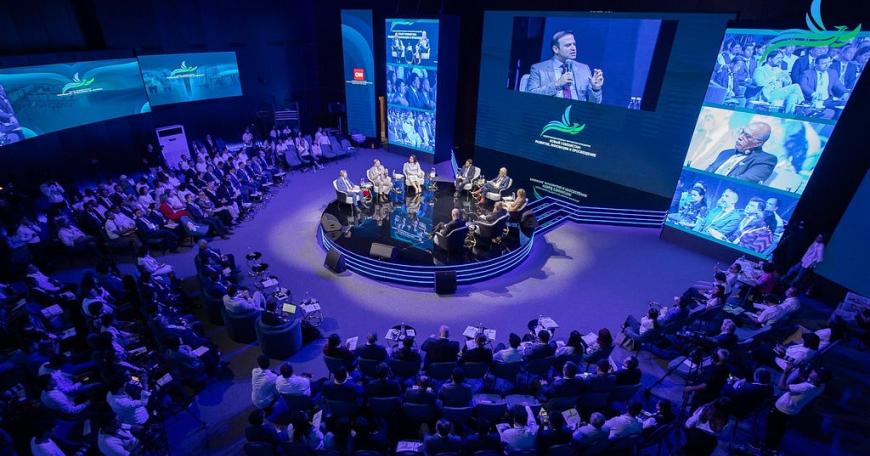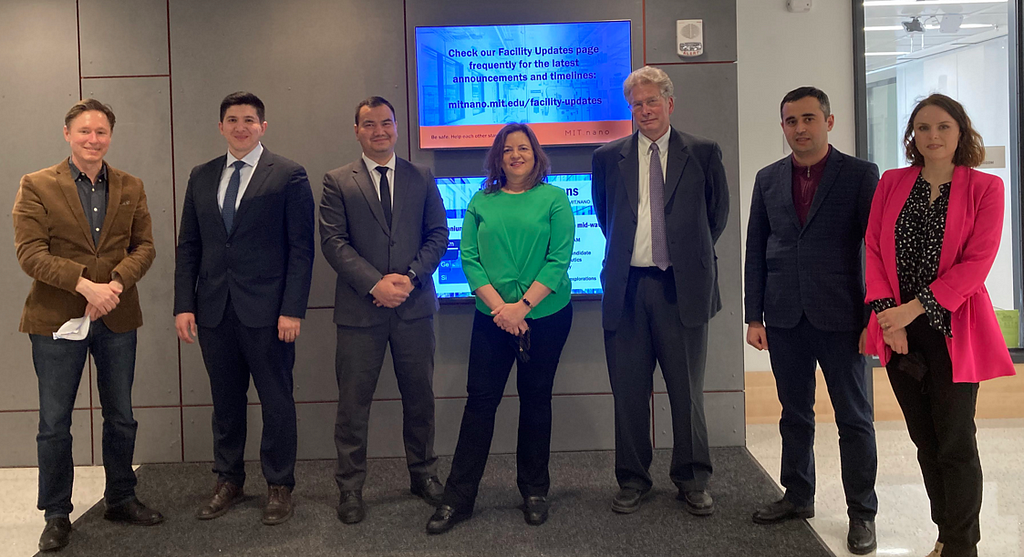
MIT Jameel World Education Lab helps shape Uzbekistan’s first autonomous university
By MIT Jameel World Education Lab
In 2019, the Republic of Uzbekistan was looking to revolutionize their higher education. As part of a nationwide initiative centered on technical, creative, and innovation skills for a vibrant modern economy, the Central Asian nation launched a network of high schools built on an innovative specialist magnet model. Now, the leaders of its recently established Agency for Presidential Educational Institutions started designing the country’s first autonomous higher education institution that would remake the university model for the coming decades, putting new technical fields, hands-on and creative learning, and humanistic perspectives into the mix. Seeking a bold new model for higher education that could serve as a testbed for education in the country and the region, Uzbekistan’s leaders approached the Massachusetts Institute of Technology and were soon connected with MIT’s Jameel World Education Lab.
In the months that followed, the New Uzbekistan University (NewUU) began to take shape. Not only would the new university act as a catalyst for the Uzbek economy and fuel industrial and commercial innovation in the country, but it would also build on the technical and cultural depth that its educational institutions had built over the years.
Professor Bahodir Ahmedov, first vice rector for academic affairs at NewUU, saw in the plans the government’s recognition of Uzbekistan as a young country, both in terms of the evolving governance of institutions and its population’s age.
“The importance of developing education, especially higher education, became apparent,” says Ahmedov.
Conversations with the Jameel World Education Lab helped the collaboration to refine its thinking at every step. Housed at MIT Open Learning, the Jameel World Education Lab collaborates with education institutions worldwide to transform education by opening the door to MIT in new ways. The Jameel World Education Lab curates MIT ideas and experience for its global members, fields and contributes to new ideas for higher education innovations that serve society, institutions, and ecosystems, and builds global collaborations and conversations.
New UU and Jameel World Education Lab collaboration kicks off

As an early step, the Jameel World Education Lab invited NewUU to participate in a customized collaborative program designed to spur ideation and explore implications. Built around initial context mapping, a weeklong site visit of MIT experts, a workshop at MIT, and additional meetings and interactions, the ideation workshop sequence helped both MIT and NewUU teams to better understand the challenges and opportunities in Uzbekistan.
“Jameel World Education Lab is always very thoughtful and selective on the projects we commit to,” says Julia Reyholds-Cuellar, associate director for membership at the Jameel World Education Lab. “When we met with Bahodir and the team behind NewUU and really came to understand their vision and passion, we knew it just made sense. We are truly honored and excited to be working with everyone at NewUU.”
The first phase of the Ideation Program included a visit to the NewUU campus in Tashkent in November 2021. Led by Professor John Brisson, four MIT experts visited schools and other sites, learned about the country, and held extensive discussions with key stakeholders, fueling MIT’s proposed ideas for the next steps.
The second phase added exploration to the mix, centered on an intensive workshop on the MIT campus for NewUU leadership, including the university’s vice rector and the Agency’s director of K-12 schools. Three main objectives informed the design for the week: to streamline the curriculum of NewUU; to immerse NewUU leaders in the experience and steps in creating new departments using MIT and other examples (such as Singapore University of Technology and Design and Olin College of Engineering); and to support NewUU leaders in designing curriculum that would enhance the learning experience for all its students. The workshop also helped NewUU to consider the fundamental design of its core offerings so as to foster innovation from within, while considering the launch of NewUU’s advanced departments.
MIT faculty and program experts, led by MIT’s Brisson, presented insights on global collaboration, higher education leadership, and course design. Lively conversations with Cynthia Breazeal, Sang-Gook Kim, Sanjay Sarma, Matthew Kressy, Vladimir Bulović, Susan Brisson, Anjali Sastry, and Ed Crawley formed part of an ongoing dialog that opened new perspectives to the NewUU team.
By the end of the Ideation Program, the team had reached some critical conclusions, including to:
- focus on foundational courses and the foundation year;
- launch a new department focused on curriculum design;
- refine their curriculum from eight to five courses;
- support the establishment of an education unit;
- use a scaffolded curriculum to include hands-on experience in all course across the departments;
- redesign student admissions;
- build a community and culture of innovation and big ideas; and
- support junior faculty.
“I think this was the biggest impact of MIT: The inspirational impact,” says Ahmedov of these outcomes. “It inspired us to find power within ourselves—bravery—to decrease the number of courses.”
In the months that followed, Jameel World Education Lab member events and workshops provided more input and discussion. During a workshop on university governance at MIT, Ahmedov told two dozen peers from across the world about NewUU’s evolving thinking about student experience. Could a small set of more intensive courses replace the traditional slate of eight or nine courses per semester? This experience underscored the importance of investing in the conversations to uncover and explore new ideas, like the radical schedule change. It also fueled discussions across members on the work of building the schedule and the shared norms that would empower students to connect their academic pursuits with action learning opportunities, including through extracurricular activities.
Working with Jameel World Education Lab, NewUU continues to innovate
In early 2024, Jameel World Education Lab and NewUU were looking ahead to next steps in shaping an innovative new campus for Uzbekistan, the region, and the world. Creative thinking and design continue as a key focus for NewUU, as does the planning for faculty and staff to learn from every teaching experience by embedding educational research capabilities into the University’s design.
The emphasis on design has already yielded notable results. For instance, in the Computer Science and Engineering program, first-year students take a course on philosophy of design, which emphasizes thinking from the user’s perspective when creating software, engineering, or any other project. Second-year students continue with an interactive design course, where they create within virtual reality labs and 3D print labs. Third-year students have a course on product design, while fourth-year students focus on industrial design.
“We are designing courses which have never before been implemented in Uzbekistan, like our series on creative thinking and design,” says Ahmedov.
The partnership with NewUU aligns with the Jameel World Education Lab’s overarching goal of studying and enabling campuses as catalysts for innovation and change where learners are guided to explore new ideas and activities to tackle societal challenges and to connect with industrial, physical, and social ecosystems throughout their learning journeys.
Read more about Campus as Catalyst and how Jameel World Education Lab works with member organizations.
Originally published at https://www.jwel.mit.edu/.
Jameel World Education Lab helps shape Uzbekistan’s first autonomous university was originally published in MIT Open Learning on Medium, where people are continuing the conversation by highlighting and responding to this story.

